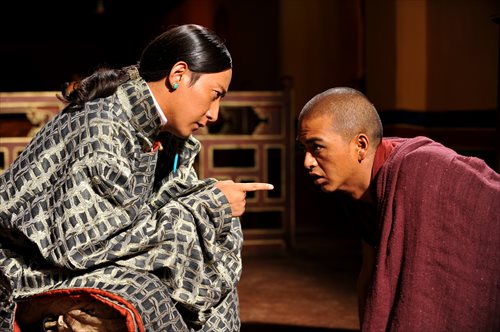Tale of Tibet
Chinese film director Fu Dongyu has been trying to decide on the English name of his latest film, Xizang Tiankong, which is set in Tibet and spans the 1950s to the 1980s.
The first choice is the literal translation, 'Tibet Sky.' The other, 'Phurbu & Tenzin,' is taken from the names of the film's two male protagonists.
Fu told the Global Times that the president of the Montreal World Film Festival, Serge Losique, suggested the first version after he saw the film in Beijing last month because he believed it would arouse more international attention due to the eye-catching word "Tibet."
"But I preferred the second translation, because it will lead people to be more concerned with the film itself and the story it tells, rather than just focusing on how the film portrays the history of a hot issue," said Fu.

Scenes from Phurbu & Tenzin Photos: Courtesy of Fu Dongyu

Scenes from Phurbu & Tenzin Photos: Courtesy of Fu Dongyu

Scenes from Phurbu & Tenzin Photos: Courtesy of Fu Dongyu
Human sentiments
The film follows two young Tibetans, Tenzin (the son of a serf owner) and Phurbu (Tenzin's personal serf), who experience the transition of Tibet from its serf society to a modern one from the 1950s to the 1980s.
Although there is a huge gap between the two in terms of their identities, families and status, Tenzin and Phurbu stick together like shadows in their childhood. However, the friendship is broken after an event that sees Tenzin nearly lose his life, and for which Phurbu is blamed and cruelly punished. Phurbu then goes to a temple and becomes a lama and dedicates his chants and blessings to Tenzin.
Later events of the film are intertwined with a series of important historical events including the People's Liberation Army of the Chinese central government entering Tibet in 1951, the Tibetan insurgency and the abolition of serfdom in 1959 and the Cultural Revolution in the 1960s. The two lead characters gradually realize that they are equal with the awakening of their self-consciousness as independent individuals, and their friendship is recovered at last.
The adult Tenzin breaks from his family, choosing to stay in Tibet when his parents move to India during the 1959 Tibetan insurgency.
"I love Tibet, I love the land I was born in," he says. However, in the face of family separation and chaos in Tibet at the time, Tenzin becomes drunk and commits a heinous act against someone he loves.
The film has been showing in major cinemas across Shanghai since the middle of April. Produced by Shanghai Film Group Corporation, it has an all-Tibetan cast and all-Tibetan dialogue, with Chinese subtitles.
Fu said he is neither a historian nor a politician, and insisted that he has tried his best to avoid putting any of his personal orientation about the history of Tibet in the film, and to only represent the real historical events in an objective way.
"This film is about the people, not the history," he emphasized. He said he tried to show not the complexity of history, but the complexity of human emotions behind historical events.
"How local people responded to those events, what kind of emotional confusion they probably experienced and how their fates changed. That is why I insisted on using an all-Tibetan cast," Fu said.
Wang Lan, the deputy director of Shanghai Writers' Association, said the film is not only about the relationship between serf owner and serf, between local people and outside forces, but also focuses on the individual quest for self and improvement.
Original Tibetan flavor
Ren Zhonglun, President of Shanghai Film Group Corporation, told the Global Times that the film cost 14 million yuan ($2.25 million) to produce. A crew of 400 people spent 10 months working in Tibet at over 3,500 meters above sea level. They recreated the old city of Lhasa, covering 20,000 square meters in the suburban district of the modern-day city.
The screenwriter, Alai, is a Chinese novelist of Tibetan descent on his mother's side. His saga novel, The Dust Settles, was published in 1998 and follows a family of Tibetan chieftains in the decade or so prior to 1951.
Ngawang Rinchen, the actor who plays Tenzin, is a member of the Modern Drama Troupe of Tibet Autonomous Region. He told the Global Times that most details related to Tibetan culture in the film are very accurate. These include a series of Tibetan Buddhist ceremonies and also some of the physical penalties inflicted on people, such as putting a huge rock on one's head and continuously pressing it from the top, and even eyegouging.
"Some audience members felt those penalties were too cruel, but they really happened in the serf society of Tibet," the actor said.
According to Ren, the movie is due for limited release in Beijing and Lhasa in the second half of 2014. A version with English subtitles will be released soon for overseas markets.
Newspaper headline: Film follows the tale of two men through turbulent times